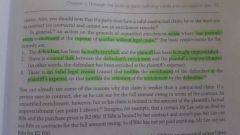![]()
![]()
![]()
Use LEFT and RIGHT arrow keys to navigate between flashcards;
Use UP and DOWN arrow keys to flip the card;
H to show hint;
A reads text to speech;
21 Cards in this Set
- Front
- Back
|
Person |
A being, entity or association which is capable of possessing legal rights and duties |
|
|
Legal Subjectivity |
Emphasis legal aspects of persons activities and existence |
|
|
Real Rights |
Ownership/Right to an object. Once a real right is established, it is everyone's duty to respect the right |
|
|
Personal Right |
The performance of a legal act is the 'object'. Operate primarily against the particular person owing the performance |
|
|
Personality Rights |
Protects various aspects of a persons personality. Physical integrity, bodily freedom, reputation, dignity, feelings, privacy. |
|
|
Constitutional Rights |
The Supreme Law of RSA |
|
|
Passive Legal Capacity |
Being able to own legal rights and duties from the start |
|
|
Capacity to Perform Juristic Acts |
The legal subjects ability to change his/her/its legal position. Expressions of Will - the person must be in capacity and understanding the legal nature and consequences of his/her acts |
|
|
State 6 Juristic Acts: |
1. Entering Contracts 2. Getting Married 3. Acquiring and Alienating Property 4. Making a will 5. Consenting to medical treatment 6. Holding office |
|
|
Capacity to be held accountable for wrongdoing. |
A person can only be found guilty if he or she acted with 'fault' (a blameworthy state of mind). Must have acted with intentiom or negligence. |
|
|
Intention |
Doing something with full capacity to understand the consequences of his or her actions |
|
|
Negligence |
Carelessness. To be considered 'negligent': 1. Person X must have considered the possibility that his action might damage someone else 2. Must have taken steps to avoid this consequences 3. X failed to take such steps |
|
|
Capacity to be held ccountable |
1. Person must mental ability to distinguish between right and wrong 2. Able to act in accordance with this understanding. |
|
|
Locus Standi in Judicio |
Legal Capacity to Litigate |
|
|
Culpae capax |
The person is accountable |
|
|
Legal Status |
Status in the eyes of the Law. Status is decided by grouping according to the South African law. South African Legal Statusbis determined by legal domicile. |
|
|
Ex Contractu |
Basis of the contract |
|
|
Contractual Liability |
Liability in terms of contract |
|
|
Delictual Liability |
Civil wrongdoings. Must prove: 1. Conduct: the person did something wrong 2. Act is legally wrong 3. Person acted with fault 4. His or her action caused... 5. Some form of damage to you Can sue for patrimonial or non-patrimonial damages |
|
|
Patrimonial/Non-Patrimonial Damages |
Patrimonial: monetary/financial loss Non-Patrimonial: compensation for physical or psychological pain. (Actio iniuriarum = compensate for impairment of personal right) |
|
|
Unjustified Enrichment |

|

